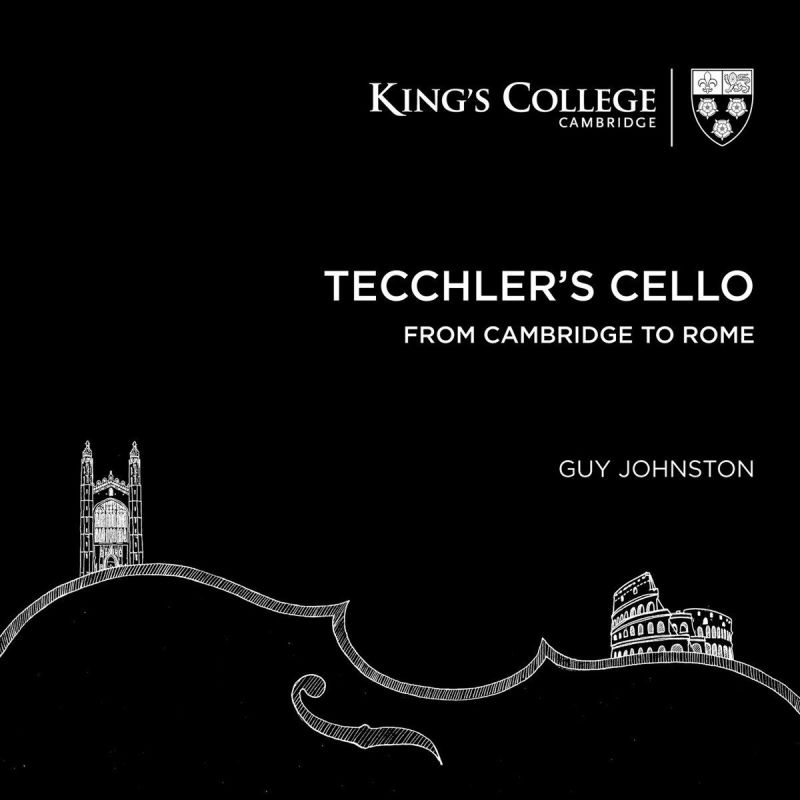Tecchler's Cello
View record and artist detailsRecord and Artist Details
Composer or Director: Ottorino Respighi, Ludwig van Beethoven, Tom Poster, David Matthews, Sheku Kanneh-Mason, Jean Barrière, Ola Gjeilo, Stephen Cleobury, Charlotte Bray, Mark Simpson
Genre:
Chamber
Label: King's College Cambridge
Magazine Review Date: 11/2017
Media Format: CD or Download
Media Runtime: 75
Mastering:
DDD
Catalogue Number: KGS0026

Tracks:
| Composition | Artist Credit |
|---|---|
| Serenity |
Ola Gjeilo, Composer
Guy Johnston, Cello King's College Choir, Cambridge Ola Gjeilo, Composer Stephen Cleobury, Composer |
| Ein Celloleben |
David Matthews, Composer
David Matthews, Composer Guy Johnston, Cello |
| Piano Trios, Movement: No. 5 in D, Op. 70/1, 'Ghost' |
Ludwig van Beethoven, Composer
Guy Johnston, Cello Ludwig van Beethoven, Composer Magnus Johnston, Violin Tom Poster, Composer |
| Un Regalo |
Mark Simpson, Composer
Guy Johnston, Cello Mark Simpson, Composer |
| Sonata for 2 Cellos |
Jean Barrière, Composer
Guy Johnston, Cello Jean Barrière, Composer Sheku Kanneh-Mason, Composer |
| Perseus |
Charlotte Bray, Composer
Charlotte Bray, Composer Guy Johnston, Cello |
| Adagio con variazioni |
Ottorino Respighi, Composer
Carlo Rizzari, Conductor Guy Johnston, Cello Ottorino Respighi, Composer Santa Cecilia Academy Orchestra, Rome |
Author: Andrew Farach-Colton
Johnston and his two brothers were all choristers at King’s College, Cambridge, and the disc opens with Ola Gjeilo’s Serenity (O magnum mysterium), a pretty, generically reverent piece for cello and choir whose gratingly saccharine New Age tinge is mitigated somewhat by the solo cello’s quietly aching counterpoint. Happily, the three brand-new solo works – all handsomely recorded in Wigmore Hall – are far more substantive and satisfying. David Matthews’s Ein Celloleben imagines the cello as hero (with a wink and nod to Strauss’s Ein Heldenleben) and pays homage to two-and-a-half centuries’ worth of repertoire in just over five minutes, yet retains a stylistic cohesion. Mark Simpson’s Un regalo is less tautly structured but its extreme juxtapositions of register and mood show off both Johnston’s virtuosity and the instrument’s character. Charlotte Bray’s work, inspired by images of a supermassive black hole in the Perseus galaxy, couples an atmosphere of cinematic spaciness with an intensity fuelled by obsessive motivic concision.
Johnston founded the Hatfield House Chamber Music Festival, where this wild-eyed performance of Beethoven’s Ghost Trio was recorded with his violinist brother Magnus and pianist Tom Poster. The overly close miking is claustrophobia-inducing at times but adds to the supernatural quality of Poster’s hyper-articulate playing in the slow movement. In the Barrière duo sonata, Johnston and Sheku Kanneh-Mason revel in the music’s intimate camaraderie.
The programme closes with Respighi’s Adagio with Variations, recorded in Rome. Johnston’s tempo is more andante than adagio, really, giving this elegiac score an unusually restless character. Despite some variability in the recorded sound from work to work, this is an enjoyable excursion and documents Johnston’s versatility.
Discover the world's largest classical music catalogue with Presto Music.

Gramophone Digital Club
- Digital Edition
- Digital Archive
- Reviews Database
- Full website access
From £8.75 / month
Subscribe
Gramophone Full Club
- Print Edition
- Digital Edition
- Digital Archive
- Reviews Database
- Full website access
From £11.00 / month
Subscribe
If you are a library, university or other organisation that would be interested in an institutional subscription to Gramophone please click here for further information.




